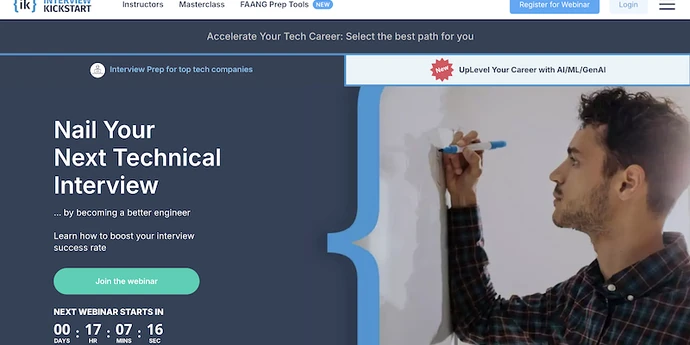Think about this: You're a pro tennis player, grinding through endless training sessions and matches, but you never have a coach. Sounds absurd, doesn’t it?
Yet, that's how many of us approach our careers. Solo, without guidance.
We stumble, guess, and hope for the best.
No wonder more people are increasingly using career coaching to gain clarity on their career goals and next steps. But what exactly is career coaching and how does it work?
Below, we’ll cover everything you need to know, whether you’re considering using coaching for yourself or your company’s employees.
And rather than giving the generic advice you’ll see in other articles on this topic, we’ve based the information below on insights from accredited career coaches on our platform and qualitative data from our coaching users.
Here’s an outline of what we’ll cover:
- What is career coaching?
- How can career coaching help you as an individual?
- How can career coaching help your company?
- How much does career coaching cost?
- Is career coaching worth it?
- When is career coaching NOT worth it?
- How does career coaching work?
- What to look for in a career coach
- Career coaching vs career counseling
1. What is career coaching?
Career coaching is when you work with a career coach to get guidance and strategies to help you reach career goals or work out your next steps.
The coach should be someone either trained in giving career advice or with strong expertise in the relevant industry or role. They’ll usually use a mix of questions, feedback, and tailored exercises to help you gain clarity, boost confidence, and make more informed decisions.
You’ll find an abundance of career coaching options available online, offering both in-person and remote sessions, either by the hour or as part of a comprehensive package. But be warned, not all career coaches are equal and there is a fair bit of bad advice out there, so it’s worth doing some research.
Click here to read our list of the 9 best career coaching services in 2024.
Linda used a coach to help her change roles at Google
"Back in February 2016, I felt stuck in a role at Google that no longer fulfilled me. I enlisted the help of an exceptional career coach, and it turned out to be one of the most worthwhile investments of my career. My coach helped me clear the mental clutter, gain clarity on my strengths, and explore viable career paths. Together, we identified leadership development as a field where I could thrive and make a significant impact.
Career coaching was not just about changing jobs; it was about aligning my career with my true aspirations and strengths. The clarity, confidence, and strategic guidance I gained were invaluable."
Linda successfully transitioned into leadership coaching and is now an accredited coach on our platform.
1.1 Different types of career coaching.
Career coaching is a bit of a catch-all term. Here are some of the different types of coaching that often fall under the umbrella of “career coaching”.
- Career path guidance: Helps you identify your strengths, interests, and goals to create a clear career plan, ensuring you take the right steps towards achieving your professional aspirations. For example, if you want to level up in your tech career, you can get tech career coaching with an expert in your field.
- Skills coaching: Focuses on developing specific skills needed for your current role or future positions, such as communication, time management, and technical abilities. For example, if you're a junior PM hoping to improve your use of PM tools and strategies, you can get product management coaching. If you're an engineer looking to level up in your career, you can get tech career coaching.
- Leadership coaching: Aims to enhance leadership qualities and managerial skills, preparing you for higher-level positions and effective team management.
- Job search coaching: Provides comprehensive support throughout the job search process, including resume coaching, interview preparation, and networking strategies, to help you land your next job. (Need coaching specifically for job searching? Read our guide on the best job search coaching services available.)
- Corporate career coaching: Tailored for businesses, this type of coaching improves employee performance, engagement, and retention by focusing on individual and team development within the organization.
- Executive coaching: Designed for senior leaders, it focuses on strategic thinking, decision-making, and leadership at the executive level to drive organizational success.
- Transition coaching: Assists individuals during significant career changes, such as switching industries, moving to a new company (for instance, you want to get guidance on how to move from Amazon to Google) starting a new job, or returning to work after a break, to ensure a smooth and successful transition.
- Entrepreneur coaching: Supports aspiring or current entrepreneurs in developing business skills, creating strategic plans, and overcoming challenges specific to starting and running a business.
2. When can career coaching help you? (as an individual)↑
People most often turn to career coaching when they need guidance on the next key steps in their career.
We’ve analyzed data from hundreds of customers to give you some examples of when career coaching can be useful (quotes are from our users):
#You need to get to the next level
“I’d like to discuss if doing an MBA is worth it, and discuss a plan to shift my career to a management position.” (Madhav, senior developer)
#You’re looking to switch roles
"I’d like to become an AI/ML engineering manager or technical program manager, either in Salesforce or other FAANG. I don't know how and where to start.” (Kanti, technical architect at Salesforce)
#You’re transitioning to a different industry
“I’m a PM for a bank but I want to get into a real tech company. I need your industry insights.” (Sarah, junior-level product manager at a major US bank)
#You’ve been laid off
“I’m leaving my position after 15 years. How can I prepare myself for the market? What kind of jobs can I look for and how can I prepare?” (Sajid, technical lead at ed-tech platform)
#You’re at the start of your job search
“How can I best position myself during job searching? How can I apply efficiently and do I have any knowledge gaps?” I also need strategies to increase my network and utilize it to get referrals.” (Alison, entry-level data scientist)
#You’re targeting a prestigious company
“I recently left Amazon and I am interested in applying to Microsoft because of its good workplace culture. I have played multiple hats previously and would like to get some guidance on the next role I will be playing.” (Mae, 6+ years experience across healthcare, retail, and tech).
#You want insights into top companies
“I want to figure out my fit for "fast-paced" and "intense" cultures such as Netflix/Meta/Snowflake. What does that actually mean and what should I prepare for?” (Levi, senior software engineer).
#You’re struggling in a new position
“I got a job at a small healthcare startup and it feels overwhelming. I need to take up responsibilities without any guidance. I need your help to navigate my way into a new startup culture of shipping products every week without any defined process and tools.” (Nidhi, product manager.)
#You need to redefine your goals
"Linear career paths are no longer the norm. Yet without an external perspective, you might be limiting yourself to a somewhat narrow definition of what career success looks like. Through continuous coaching conversations, you can redefine what makes you happy, and how you can translate insights into actionable steps forward". Valentina, Career and Leadership Coach
#You’re evaluating which track to take
“I want to get a sense of where I stand on management vs IC track, and a possible path to get better if I want to go back to management in the future.” (Adrian, engineer at a FAANG company)
#You want an objective opinion on feedback
“I’d like to discuss my performance review.” (Edward, software engineer at Uber).
# You’re trying to balance work and personal commitments
“Caregiving commitments have caused long delays in my career progression. I’d like to find a way of communicating my complicated family situation at work without it sounding like an excuse.” (Marco, SWE targeting a role at Nvidia)
#You just want to improve your skills
"I'm constantly receiving good feedback from the VPs and CTO to whom I report, but I want to challenge myself and improve as an engineer and leader. I want to identify weak points that I haven't yet and discuss how I can improve on them." (Seb, technical director at an e-commerce platform).
#You’re facing conflicts at work
“I need to be better at spotting harassment or mobbing and learn how to avoid it.” (David, software engineer)
Of course, the real situations above are just a glimpse of the many reasons that people choose to use career coaching.
Skip to section 5 below to see more about how career coaching can help you as an individual.
“Many years ago, a leader and coach at Google reminded me that “you have agency”. Every time I think of it, it helps me feel more intentional and in control. I often share this with others: three simple words that constitute a powerful notion, no matter how you are looking to grow in your career. " Valentina, Career and Leadership Coach.
3. How can career coaching help your company?↑
If you’re in an HR or management position, you might be considering investing in coaching for your team. Let’s take a look at the main selling points:
- Improves employee performance
- Increases employee retention (thanks to higher job satisfaction)
- Often makes employees more engaged with their work and the company
- Improves morale (employees appreciate that the company is investing in their growth)
- Facilitates smoother transitions during organizational changes (mergers, acquisitions, or restructurings)
- Can sometimes provide a framework for identifying high-potential employees
- Can identify and nurture potential leaders
So how does career coaching for companies work?
Over the last decade, there has been a trend toward holistic, yet hyper-targeted learning solutions for companies and their teams.
The process typically starts with an initial assessment to understand the organization's needs and goals, as well as evaluating employees' skills and development areas. Based on this assessment, a tailored coaching program is created, aligning with company objectives and addressing specific employee needs.
“Effective coaching programs are those that are embedded in the company’s broader talent development efforts, so that what you learn from on a stretch assignment, a performance review, or a group workshop all complement each other" explains Valentina. "This gives you an opportunity to deepen and customize your learnings in conversation with your coach.”
Of course, it depends on the coaching provider, but the program may include one-on-one coaching sessions focusing on personal development and career planning, as well as group sessions to address common challenges and enhance team cohesion.
Ideally, the coaching process will involve ongoing support and continuous feedback to help employees apply their learning and progress towards their goals.
4. How much does career coaching cost?↑
As an individual, you can find a huge range of career coaching prices. If you're willing to take a chance on sites like Fiverr, you can find coaches for under $50 per hour, meanwhile, comprehensive coaching packages with experienced coaches can cost several thousand dollars. Generally, to hire an experienced, high-quality coach with the necessary industry knowledge, you’ll usually need to spend upwards of $100 per hour.
Here’s a list of some popular coaching services and their prices.
IGotAnOffer: $119-$149 per 1-hour session
MentorCruise: $40-$500 per month for mentorship
The Muse: $56-$275 for a 30-minute Q&A
Career Contessa: $75 - $280 per 50-minute session
PathUp: $289 per session
Arielle Executive Coaching: Starts at $3,500 per package
5. Is career coaching worth it?↑
We’ve coached a lot of people on our platform. We’ve studied what they said about their coaching sessions and picked out the top seven ways it can help (when we've quoted from our career coaching users, we've changed their name to protect their privacy).
# Coaching can help you make informed decisions
We often take career steps based on emotions or hunches. Talking to an expert can help you make that crucial decision based on facts.
"Good coaching provides you with a framework that can help you think through current and future scenarios in a more structured manner. The full value of this will reveal itself long after the initial coaching conversation. It’s an approach that focuses on critical thinking and sustainability." Valentina, Career and Leadership Coach.
# It helps you switch from passive to proactive
Even for high achievers, it’s easy to go through our careers passively reacting to events. Coaching can help put you in control and give you tools to actively drive your career.
"Coaching can help you achieve more in less time by putting yourself in the driving seat and being much more confident, proactive and aware." Christian, Career Coach.
# A coach can reveal new opportunities
Sometimes an expert can make you realize that you had more options available to you than you thought, especially when you’re looking to switch jobs.
Simon wanted to switch from medicine to software engineering. He wanted to discuss his career strategy, his resume, and his personal project.
“Sai offered valuable suggestions about my career path that I had not previously considered”.
# A coach will motivate you and hold you accountable
Sometimes, especially after years or even decades of hard work, your motivation can flag. Talking to a coach can make you see your situation in a more positive light and inspire you with the fresh energy that you need.
Ashish had been recently laid off when he decided to do some career coaching.
‘Kirill was helpful in challenging me to push myself to the next level. He also helped me think about my career, how I communicate, and how to craft a message that is meaningful.”
Valentina often finds that the high expectations people hold themselves to can often hold them back:
“You don’t have to have it all figured out to make progress in your career. In fact, this tendency towards perfection can keep you from moving forward at all. I often encourage people to balance reflection with action. Try new things and revise your assumptions often. Experiment and iterate as you go. This is where a coach can be a helpful sounding board and accountability partner.”
# Real insights can be hard to find elsewhere
It’s natural to talk things over with friends or family and it can be helpful, but advice based on specific knowledge is a lot more valuable to your career.
Karl is an engineering manager who was targeting a role at Uber and needed specifc insights about the company and the interviewing process.
“Jeff is willing to use his deep knowledge to offer insightful and actionable feedback. His advice is super critical to my career and I strongly recommend him.”
# Coaching can (sometimes) provide an immediate solution
Hiring a coach can be especially valuable when you’re facing a specific problem at work that you don’t know how to deal with. A coach with experience in these areas will be able to give you specific, actionable advice on what you should do next.
“Sai has given examples of how he has solved leadership situations regarding risk management, conflict management and program management.” Juan, head of technology at a major bank.
# It’s healthy to be challenged
Sometimes it does you good to get your assumptions and beliefs challenged, especially when you’re in a senior role and used to people agreeing with you. An experienced coach won’t shy away from poking holes in your assumptions and giving you a new perspective on your career.
Linda used a career coach to help her change from sales to leadership coaching.
"Is career coaching worth it? Absolutely. The investment in a good career coach can lead to profound professional and personal growth. For anyone feeling stuck or uncertain about their career path, a career coach can be the catalyst for transformative change, just as it was for me."
6. When is career coaching not worth it?↑
Career coaching can be very beneficial but that doesn’t mean it’s the right choice for every person in every context. Let’s take a look at when it’s probably not the right move for you.
# When you’re not ready to put the work in
Benefiting from career coaching sessions usually requires more than just the time you spend talking to the coach. But you might not be at a moment in your life when you’re ready to put that extra work into yourself and your career. Be honest with yourself before investing in coaching that you’re not going to make the most out of.
# When the coach is mediocre
Coaching is a very unregulated industry. There are some industry accreditations but they differ in standards and having a coaching qualification isn’t always a guarantee of a great coach. There are plenty of coaches out there doling out generic, state-the-obvious (or even just plain bad) advice that can leave you feeling sold short.
Try and avoid this problem by reading lots of reviews of the coaching company and the specific coach you’ll be working with.
# When the coach isn’t the right fit
Some coaching providers may match you with a coach who doesn’t have the specific industry or skills experience that you’re looking for. You can avoid this problem by choosing the coach yourself.
7. What to look for in a career coach↑
When you’re looking for a career coach, apply the “Experience x 3” rule. Put simply, you need to evaluate:
- The coach’s experience: read their bio to see if their expertise fits your needs. Have they worked at any of the top companies in your industry? Do they mention coaching for specific skills you want to work on?
- Clients’ experiences: read reviews from people they have coached. Don’t just look at the star rating, get a sense of the coach’s strengths and consider whether it matches what you’re looking for.
- The user experience: assess the overall experience on the coaching platform - can you book easily, is customer support available, do they offer a money-back guarantee, etc?
"A good coach doesn't need to be like you or to understand your job fully. Nevertheless, it's proven that we look for others "like us", and a coach in your industry will be able to share some mentoring tips that others could not." Christian, career coach.
8. How does career coaching work?
Career coaching works slightly differently depending on the coach or platform you’re using, but the first step is usually to book time with the coach and explain what you’re hoping for from the session. On platforms like ours, you can do this in a written message to the coach but some coaching services hold an introductory call with you to assess your needs and objectives.
“Aligning on goals and expectations is such an important part of setting up a successful coaching relationship. Getting on the same page early about what can and cannot be done will save you time, effort and uncomfortable conversations down the road. It takes honesty, vulnerability and kindness on both sides.” Valentina, Career and Leadership Coach.
Most coaching is done online, but there are presencial options available. During your session, you can expect the coach to listen actively to your problems and offer actionable advice. They should help you identify specific goals and start taking steps to work towards them.
Some coaches will keep in touch between sessions to check your progress or answer questions, while others will limit their interaction to the hours you pay for. Likewise, some coaching services are set up for long-term coach-coachee relationships, whereas others are more suited to booking just a few sessions to solve a pressing problem.
If you’re interested in goal-specific coaching or long-term mentoring, check out our lists of recommendations to find an option that suits your needs.
- Best interview coaching services
- Best career coaching services
- Best online coaching platforms
- Best leadership and executive coaching services
- Best career transition coaching services
- Best salary negotiation coaching services
- Best online mentoring platforms
Looking for location-specific recommendations? Check out our guide: Best career coaching services in San Francisco, CA.
9. What’s the difference between career coaching and career counseling?↑
Career coaching and career counseling, while often used interchangeably, have distinct differences in approach and focus.
Career coaching is goal-oriented and future-focused, emphasizing actionable strategies and steps for career development. It provides practical advice to improve professional skills and performance, often involving personalized action plans aimed at immediate career progression.
On the other hand, career counseling is more explorative, helping individuals understand their career interests, values, and passions by examining past experiences and current situations. It provides deeper psychological support, addressing personal issues that impact career decisions.
10. Choose from over 200 career coaches↑
If you work as a product manager, software engineer, data scientist, etc., or are considering switching into one of those roles, IGotAnOffer is the ideal platform for you. Our 200+ career coaches have worked at top companies such as Google, Meta, McKinsey, Goldman Sachs, etc., and so will be able to give you expert, highly relevant advice on your next career steps.
Click on a coach’s profile and instantly see their hourly availability and book your online session in just a few clicks, Prices are clearly displayed before you book and if you’re not satisfied with your session, you get a full refund.















